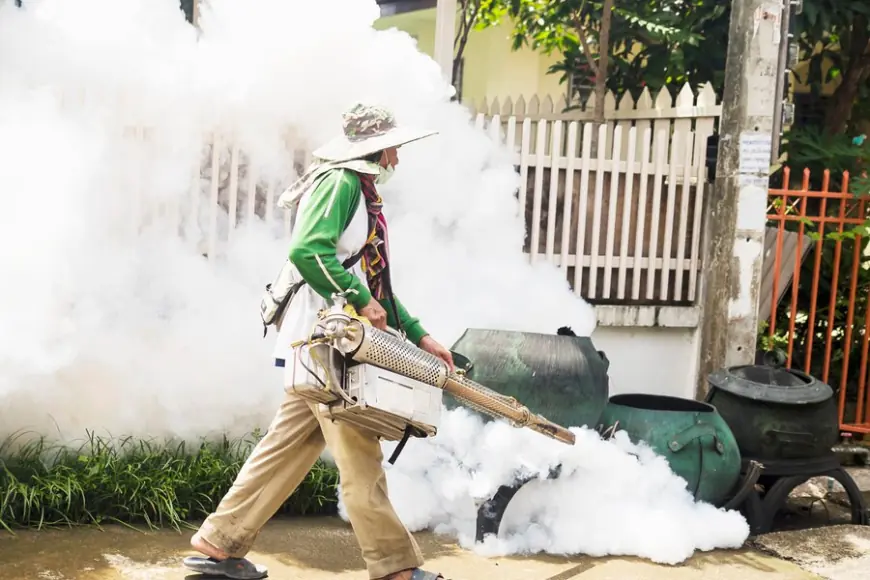How to Keep Your Home Pest-Free Without Harming the Environment
The good news is that you can keep your home pest-free using natural, eco-friendly pest control Portland methods that are both safe and effective.

Pests can be a significant nuisance, invading homes, damaging property, and posing health risks. While traditional pest control methods rely on harsh chemicals, these solutions can negatively impact human health, pets, and the environment. The good news is that you can keep your home pest-free using natural, eco-friendly pest control Portland methods that are both safe and effective.
Why Choose Eco-Friendly Pest Control?
Conventional pesticides contain toxic chemicals that not only kill pests but also harm beneficial insects, contaminate soil, and pollute water sources. Exposure to these chemicals can lead to respiratory issues, allergies, and even long-term health concerns. Instead, adopting green pest control methods helps protect your home while ensuring a healthier environment for your family.
1. Keep Your Home Clean and Clutter-Free
A clean home is your first line of defense against pests. Most household pests, including ants, cockroaches, and rodents, are attracted to food crumbs, spills, and clutter. Here’s how you can minimize their presence:
- Wipe down surfaces daily to remove food residues.
- Store food in airtight containers to prevent pest access.
- Take out the trash regularly, ensuring bins have tight-fitting lids.
- Declutter your home to eliminate hiding spots for pests.
By maintaining a tidy home, you reduce the chances of infestations and create an unwelcoming environment for pests.
2. Seal Entry Points to Prevent Infestation
Pests often enter homes through tiny cracks, gaps, and openings. Conduct a thorough inspection of your property and seal these potential entry points:
- Use caulk or weather stripping to close gaps around doors and windows.
- Repair any holes or cracks in walls, floors, and ceilings.
- Install door sweeps to prevent pests from sneaking in.
- Seal gaps around plumbing and utility lines to block access.
By fortifying your home’s defenses, you make it significantly harder for pests to invade.
3. Use Natural Pest Repellents
Chemical-free pest repellents can effectively deter pests without harming the environment. Here are some natural remedies to try:
- Peppermint oil – A natural deterrent for mice, spiders, and ants. Simply mix a few drops with water and spray around entry points.
- Vinegar solution – Wiping down countertops with a vinegar and water mixture can repel ants.
- Diatomaceous earth (DE) – A non-toxic powder that kills insects by dehydrating them. Sprinkle it around baseboards and entry points.
- Cedarwood chips – Effective in repelling moths, cockroaches, and fleas.
4. Encourage Natural Predators
One of the best ways to manage pests without chemicals is by introducing natural predators. Some beneficial species that help keep pests in check include:
- Ladybugs and lacewings – They feed on aphids and garden pests.
- Spiders – While many fear them, most spiders help reduce insect populations.
- Birds and bats – Installing bird feeders or bat houses can encourage these natural pest controllers to settle in your yard.
By promoting biodiversity in your surroundings, you can naturally manage pest populations.
5. Grow Pest-Repelling Plants
Certain plants act as natural pest deterrents, making them a valuable addition to your home and garden:
- Lavender – Keeps mosquitoes and moths at bay.
- Basil – Repels houseflies and mosquitoes.
- Marigolds – Their scent deters aphids and other insects.
- Rosemary and thyme – Help repel mosquitoes and flies.
Planting these herbs and flowers around entry points and windows can create a natural pest barrier.
6. Proper Waste Management
Pests thrive in areas where food and waste are easily accessible. To minimize the risk:
- Compost correctly – Ensure compost bins are sealed to prevent attracting rodents.
- Dispose of garbage regularly – Accumulated waste can attract flies, roaches, and rodents.
- Keep pet food sealed – Leftover pet food can be a major attraction for pests.
By managing waste efficiently, you can make your home less inviting to pests.
7. Use Non-Toxic Traps
Instead of resorting to chemical-laden pesticides, opt for eco-friendly alternatives:
- Sticky traps – Ideal for catching insects without toxins.
- Humane rodent traps – Capture mice and release them far from your home.
- DIY fruit fly traps – A jar with apple cider vinegar and a few drops of dish soap can effectively trap flies.
Using non-toxic traps is a safe and effective way to control pest populations.
8. Maintain Your Yard
Outdoor areas can become breeding grounds for pests if not properly maintained. Here’s how to keep them at bay:
- Trim bushes and trees to prevent pests from entering through branches.
- Remove standing water to eliminate mosquito breeding spots.
- Keep firewood stored away from your home to deter termites and rodents.
- Mow the lawn regularly to reduce hiding places for insects.
A well-maintained yard discourages pests from settling near your home.
9. Hire a Green Pest Control Service
If your pest problem persists, consider seeking professional help. Many companies now offer eco-friendly pest control Portland services that prioritize non-toxic solutions. These professionals use Integrated Pest Management (IPM) techniques to address infestations while minimizing harm to the environment.
Final Thoughts
Keeping your home pest-free without harming the environment is not only possible but also highly beneficial for your health and well-being. By adopting natural deterrents, sealing entry points, and maintaining cleanliness, you can effectively prevent infestations without relying on toxic chemicals. If needed, professional eco-friendly pest control Portland services can provide sustainable solutions to protect your home while preserving the environment.
What's Your Reaction?
 Like
0
Like
0
 Dislike
0
Dislike
0
 Love
0
Love
0
 Funny
0
Funny
0
 Angry
0
Angry
0
 Sad
0
Sad
0
 Wow
0
Wow
0

















































